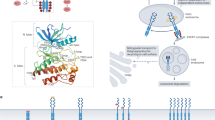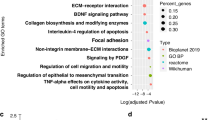Abstract
Crouzon Syndrome (CS), Pfeiffer syndrome (PS) and the phenotypically related Jackson-Weiss (JW) variant are three craniosynostotic conditions caused by heterozygous mutations in Fibroblast Growth Factor Receptor (FGFR) genes. Screening a large cohort of 84 patients with clinical features of CS, PS or JW by direct sequencing of genomic DNA, enabled FGFR1, 2 or 3 mutation detection in 79 cases. Mutations preferentially occurred in exons 8 and 10 of FGFR2 encoding the third Ig loop of the receptor. Among the 74 FGFR2 mutations that we identified, four were novel including three missense substitutions causing CS and a 2 bp deletion creating a premature stop codon and producing JW phenotype. Five FGFR2 mutations were found in one of the two tyrosine kinase subdomains and one in the Ig I loop. Interestingly, two FGFR2 mutations creating cysteine residues (W290C and Y340C) caused severe forms of PS while conversion of the same residues into another amino-acid (W290G/R, Y340H) resulted in Crouzon phenotype exclusively. Our data provide conclusive evidence that the mutational spectrum of FGFR2 mutations in CS and PS is wider than originally thought. Genotype-phenotype analyses based on our cohort and previous studies further indicate that in spite of some overlap, PS and CS are preferentially accounted for by two distinct sets of FGFR2 mutations. A limited number of recurrent amino-acid changes (W290C, Y340C, C342R and S351C) is commonly associated with the most severe Pfeiffer phenotypes of poor prognosis.
Similar content being viewed by others

Log in or create a free account to read this content
Gain free access to this article, as well as selected content from this journal and more on nature.com
or
References
Hall CM : International nosology and classification of Constitutional disorders of bone, 2005, 7th International Skeletal Dysplasia Meeting Martigny, Switzerland.
Cohen Jr MM : Pfeiffer syndrome update, clinical subtype and guidelines for differential diagnosis. Am J Med Genet 1993; 45: 300–307.
Reardon W, Winter RM, Rutland P et al: Mutations in the fibroblast growth factor receptor 2 gene cause Crouzon syndrome. Nat Genet 1994; 8: 98–102.
Jabs EW, Li X, Scott AF et al: Jackson-Weiss and Crouzon syndromes are allelic with mutations in fibroblast growth factor receptor 2. Nat Genet 1994; 8: 275–279.
Lajeunie E, Ma HW, Bonaventure J et al: FGFR2 mutations in Pfeiffer syndrome. Nat Genet 1995; 9: 108.
Rutland P, Pulleyn LJ, Reardon W et al: Identical mutations in the FGFR2 gene cause both Pfeiffer and Crouzon syndrome phenotypes. Nat Genet 1995; 9: 173–176.
Wilkie AOM, Slaney SF, Oldridge M et al: Apert syndrome results from localized mutations of FGFR2 and is allelic with Crouzon syndrome. Nat Genet 1995; 9: 165–172.
Przylepa KA, Paznekas W, Zhang M et al: Fibroblast Growth Factor Receptor 2 mutations in Beare-Stevenson cutis gyrata syndrome. Nat Genet 1996; 13: 492–494.
Muenke M, Schell U, Hehr A et al: A common mutation in the fibroblast growth factor receptor 1 gene in Pfeiffer syndrome. Nat Genet 1994; 8: 269–274.
Schell U, Hehr A, Feldman GJ et al: Mutations in FGFR1 and FGFR2 cause familial and sporadic Pfeiffer syndrome. Hum Mol Genet 1995; 4: 323–328.
Moloney DM, Slaney SF, Oldridge M et al: Exclusive paternal origin of new mutations in Apert syndrome. Nat Genet 1996; 13: 48–53.
Glaser RL, Jiang W, Boyadjiev SA et al: Paternal origin of FGFR2 mutations in sporadic cases of Crouzon Syndrome and Pfeiffer syndrome. Am J Hum Genet 2000; 66: 768–777.
Tartaglia M, Valeri S, Velardi F et al: Trp290cyst mutation in exon IIIa of the fibroblast growth factor receptor 2 (FGFR2) gene is associated with Pfeiffer syndrome. Hum Genet 1997; 99: 602–606.
Passos-Bueno MR, Wilcox WR, Jabs EW et al: Clinical spectrum of Fibroblast Growth Factor Receptor mutations. Hum Mutat 1999; 14: 115–125.
Kan S, Elanko N, Johnson D et al: Genomic screening of fibroblast growth factor receptor 2 reveals a wide spectrum of mutations in patients with syndromic craniosynostosis. Am J Hum Genet 2002; 70: 472–486.
Meyers GA, Orlow SJ, Munro IR, Przylepa KA, Jabs EW : Fibroblast Growth Factor Receptor 3 (FGFR3) transmembrane mutation in Crouzon syndrome with acanthosis nigricans. Nat Genet 1995; 11: 462–464.
Ingersoll RG, Paznekas WA, Tran AK et al: Fibroblast growth factor 2 (FGFR2): genomic sequence and variations. Cytogenet Cell Genet 2001; 94: 121–126.
Lajeunie E, Cameron R, El Ghouzzi V et al: Clinical variability in patients with Apert's syndrome. J Neurosurg 1999; 90: 443–447.
Ma HW, Lajeunie E, Le Merrer M et al: No evidence of genetic heterogeneity in Crouzon craniofacial dysostosis. Hum Genet 1995; 96: 731–735.
Cornejo-Roldan LR, Roessler E, Muenke M : Analysis of the mutational spectrum of the FGFR2 gene in Pfeiffer syndrome. Hum Genet 1999; 104: 425–431.
Kress W, Collmann H, Büsse M, Halliger-Keller B, Mueller CR : Clustering of FGFR2 gene mutations in patients with Pfeiffer and Crouzon syndromes (FGFR2-associated craniosynostoses). Cytogenet Cell Genet 2000; 91: 134–137.
Wilkie AOM, Patey SJ, Kan S-H et al: FGFs, their receptors and human limb malformations: clinical and molecular correlations. Am J Med Genet 2002; 112: 266–278.
Cohen Jr MM : FGFs/FGFRs and associated disorders; in Epstein CJ, Erickson RP, Wynshaw-Boris A (eds): Inborn errors of development. New York: Oxford University press, 2004, pp 380–400.
Schaefer F, Anderson C, Can B, Say B : Novel mutation in the FGFR2 gene at the same codon as the Crouzon syndrome mutations in a severe Pfeiffer syndrome type 2 case. Am J Med Genet 1998; 75: 252–255.
Zackai EH, McDonald-McGinn DM, Stolle C, Huff DS : Craniosynostosis with tracheal sleeve: a patient with Pfeiffer syndrome, tracheal sleeve and additional malformations in whom an FGFR2 mutation was found. Clin Dysmorphol 2003; 12: 209.
Nazarro A, Della Monica M, Lonardo F et al: Prenatal ultrasound diagnosis of a case of Pfeiffer syndrome without cloverleaf skull and review of the literature. Prenat Diagn 2004; 24: 918–922.
Shotelersuk V, Ittiwut C, Srivuthana S et al: Distinct craniofacial-skeletal-dermatological dysplasia in a patient with W290C mutation in FGFR2. Am J Med Genet 2002; 113: 4–8.
Blaumeiser B, Loquet P, Wuyts W, Nothen MM : Prenatal diagnosis of Pfeiffer syndrome type II. Prenat Diagn 2004; 24: 644–646.
Bellus GA, Gaudenz K, Zakai EH et al: Identical mutations in three different fibroblast growth factor receptor genes in autosomal dominant craniosynostosis syndromes. Nat Genet 1996; 14: 174–175.
Bellus GA, Spector EB, Speiser PW et al: Distinct missense mutations of the FGFR3 Lys 650 codon modulate receptor kinase activation and the severity of the skeletal dysplasia phenotype. Am J Hum Genet 2000; 67: 1411–1421.
Gripp KW, Stolle CA, McDonald-McGinn DM et al: Phenotype of the fibroblast growth factor receptor 2 Ser 351Cys mutation: Pfeiffer syndrome type III. Am J Med Genet 1998; 78: 356–360.
Sweeney E, Ellis I, May P : Sacral appendage associated with a mutation in FGFR2. Clin Dysmorphol 2002; 11: 221–222.
Gonzales M, Heuertz S, Martinovic J et al: Vertebral anomalies and cartilagineous tracheal sleeve in three patients with Pfeiffer syndrome carrying the S351C FGFR2 mutation. Clin Genet 2005; 68: 179–181.
Reardon W, Smith A, Honour JW et al: Evidence for digenic inheritance in some cases of Antley-Bixler syndrome. J Med Genet 2000; 37: 26–32.
Tsai F-J, Wu J-Y, Yang C-F, Tsai C-H : Further evidence that fibroblast growth factor receptor 2 mutations cause Antley-Bixler syndrome. Acta Paediatr 2001; 90: 595–597.
Fluck CE, Tajima T, Pandey AY et al: Mutant P450 oxidoreductase causes disordered steroidogenesis with and without Antley-Bixler syndrome. Nat Genet 2004; 36: 228–230.
Robertson SC, Tynan JA, Donoghue DJ : RTK mutations and human syndromes: when good receptors turn bad. Trends Genet 2000; 16: 265–271.
Anderson J, Burns HD, Enriquez-Harris P et al: Apert syndrome mutations in fibroblast growth factor receptor 2 exhibit increased affinity for FGF ligand. Hum Mol Genet 1998; 7: 1475–1483.
Yu K, Herr AB, Waksman G, Ornitz DM : Loss of fibroblast growth factor receptor 2 ligand-binding specificity in Apert syndrome. Proc Natl Acad Sci USA 2000; 97: 14536–14541.
Ibrahimi OA, Zhang F, Eliseenkova AV et al: Biochemical analysis of pathogenic ligand-dependent FGFR2 mutations suggests distinct pathophysiological mechanisms for craniofacial and limb abnormalities. Hum Mol Genet 2004; 13: 2313–2324.
Del Gatto F, Plet A, Gesnel A et al: Multiple interdependent sequence elements control splicing of a Fibroblast Growth factor Receptor 2 alternative exon. Mol Cell Biol 1997; 17: 5106–5116.
Carstens RP, Wagner EJ, Garcia-Blanco MA : An intronic splicing silencer causes skipping of the IIIb exon of fibroblast growth factor receptor 2 through involvement of polypyrimidine tract binding protein. Mol Cell Biol 2000; 20: 7388–7400.
Oldridge M, Zackai EH, McDonald-McGinn DM et al: De novo Alu-element insertions in FGFR2 identify a distinct pathological basis for Apert syndrome. Am J Hum Genet 1999; 64: 446–461.
Tsukuno M, Suzuki H, Eto T : Pfeiffer syndrome caused by haploinsufficient mutation of FGFR2. J Craniofac Genet Dev Biol 1999; 19: 183–188.
Hajihosseini MK, Wilson D, de Moerlooze L, Dickson C : A splicing switch and gain-of-function mutation in FGFR2-IIIc hemizygotes causes Apert/Pfeiffer-syndrome-like phenotypes. Proc Natl Acad Sci USA 2001; 2798: 3855–3860.
Eswarakumar VP, Monsonego-Ornan E, Pines M et al: The IIIc alternative of FGFR2 is a positive regulator of bone formation. Development 2002; 129: 3783–3793.
Acknowledgements
We thank patients and their families for their participation in this study.
Author information
Authors and Affiliations
Corresponding author
Additional information
This study is dedicated to the memory of Elisabeth Lajeunie-Renier
Rights and permissions
About this article
Cite this article
Lajeunie, E., Heuertz, S., El Ghouzzi, V. et al. Mutation screening in patients with syndromic craniosynostoses indicates that a limited number of recurrent FGFR2 mutations accounts for severe forms of Pfeiffer syndrome. Eur J Hum Genet 14, 289–298 (2006). https://doi.org/10.1038/sj.ejhg.5201558
Received:
Revised:
Accepted:
Published:
Issue date:
DOI: https://doi.org/10.1038/sj.ejhg.5201558
Keywords
This article is cited by
-
Development and validation of an expanded targeted sequencing panel for non-invasive prenatal diagnosis of sporadic skeletal dysplasia
BMC Medical Genomics (2021)
-
Severe craniolacunae and upper and lower extremity anomalies resulting from Crouzon syndrome, FGFR2 mutation, and Ser347Cys variant
Child's Nervous System (2021)
-
Craniosynostosis affects the majority of mucopolysaccharidosis patients and can contribute to increased intracranial pressure
Journal of Inherited Metabolic Disease (2018)
-
Reduced dosage of ERF causes complex craniosynostosis in humans and mice and links ERK1/2 signaling to regulation of osteogenesis
Nature Genetics (2013)
-
The Fgfr2 W290R mouse model of Crouzon syndrome
Child's Nervous System (2012)


